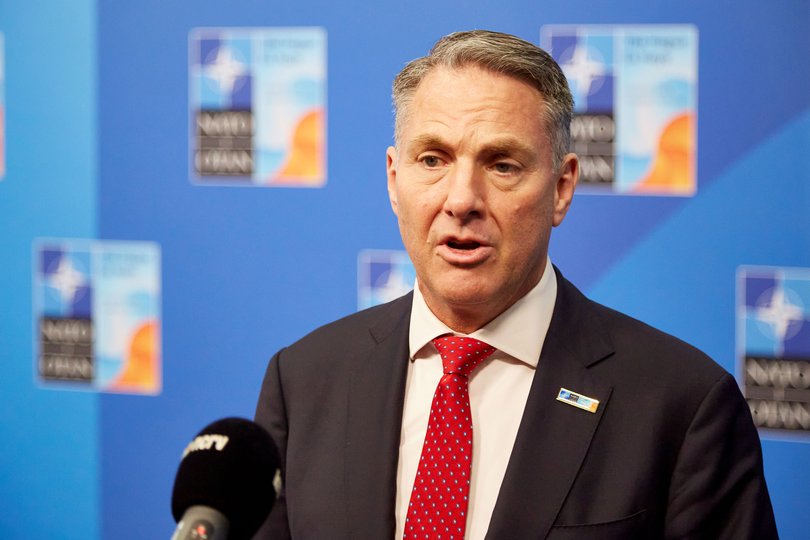ELLEN RANSLEY: Europe has bowed to Donald Trump’s defence demands. Now it’s Australia’s turn
ELLEN RANSLEY: The US President has long called for Europe to lift its defence spending. So it was little wonder Donald Trump claimed credit in doing ‘something that no one really thought possible’.
It was a meeting of 32 allies, but the NATO summit was all about one man: Donald “Daddy” Trump.
The United States President was treated like a king in The Hague to keep America inside the alliance. That almost the entire group - bar Spain - gave Mr Trump his second major win of the week and agreed to massively increase their defence spending was a means to that end.
Australia is not a member of NATO, but it is also feeling the pressure from the Trump Administration. The NATO decision could mean pressure also comes from European partners with stakes in the Indo-Pacific.
Sign up to The Nightly's newsletters.
Get the first look at the digital newspaper, curated daily stories and breaking headlines delivered to your inbox.
By continuing you agree to our Terms and Privacy Policy.But just like for NATO partners, a build-up of our own defence capabilities shouldn’t be just because someone asked us to do it, but because the reality demands it.
At the current rate, Australia spends two per cent of GDP on defence, to increase to 2.3 per cent by the mid-2030s. The Trump Administration has made no secret it wants to see us get to 3.5 per cent and believes it’s critical to counter China’s own massive buildup.
The US President has long called for Europe to lift its defence spending and reduce its reliance on America. So it was little wonder Mr Trump claimed credit in doing “something that no one really thought possible”.
NATO secretary general Mark Rutte heaped praise on the President for “pushing us”.
But lifting defence spending to five per cent (3.5 per cent of which is to be designated for core defence capability) wasn’t entirely about capitulating to the US President and keeping him onside.
Mr Trump’s ambiguity over Article 5 - the call for collective defence – made leaders nervous. Russia’s war in Ukraine and Moscow’s increasingly brazen campaign of sabotage against Europe added to the urgency.
Whatever the ultimate motivation was, NATO members surely breathed a sigh of relief as Mr Trump headed back to the US feeling “a little bit different” about the alliance.
But they also got a front row seat to what happens if you defy the President.
Mr Trump has threatened to hit Spain - which has only just hit the 2 per cent target set by NATO in 2014 - by making them “pay twice as much” with trade sanctions over its decision not to commit to five per cent.
As an unashamedly transactional leader, there’s nothing to prevent Mr Trump from telling Prime Minister Anthony Albanese - when that meeting finally happens - that if Australia does not get to that level, Washington will punish Canberra.
It could mean prolonged trade imposts or new tariffs, or it could mean taking part of the $368 billion AUKUS agreement hostage.
The announcement of a snap Pentagon review into the trilateral submarines deal last month heightened anxiety that Trump could try and tie America’s future participation in the deal to demand Australia spend more on defence.
Whether that’s the aim or not, the Government says it won’t make its decisions based on what America is asking for, nor based on a figure.
Prime Minister Anthony Albanese said this week he wouldn’t announce billions of extra dollars in spending without saying what the money was for, as he said the Coalition did during the last election campaign.
“We will ensure that Australia has the capability that we need,” he said.
On the sidelines of the NATO summit, Defence Minister Richard Marles reinforced that message.
“We’ve gone through our own process of assessing our strategic landscape, assessing the threats that exist there, and the kind of defence force we need to build in order to meet those threats, to meet the strategic moment, and then to resource that,” he said.

“And what that has seen is the biggest peacetime increase in Australian Defence spending. Now that is a story which is understood here, and we’ll continue to assess what our needs are going forward. And as our prime minister has said, we will resource that.”
Back at home, Finance Minister Katy Gallagher said there will be further investments in defence because the world order demanded it.
She said if agencies come to the Government and say “‘this is the capability we need, and this is the funding that’s required’, we have provided that funding, and that’s the approach we’ll continue to take”.
“I have no doubt that because of the environment that we are in, the strategic environment that we’re in, that there will be further investments in defence,” she said.
“But what the point I’m saying is it’s not only about money, it’s actually about delivering what that investment is meant for.”
But shadow defence minister Angus Taylor is demanding a different approach.
“Their own strategic review … is not properly funded… It’s clear that two per cent of GDP is not what is necessary in this modern, uncertain geopolitical environment where we are seeing authoritarian regimes flexing their muscles,” he said.
It’s that environment that has defence experts like Jennifer Parker also wanting the Government to do more.
“It’s true to say we’ve increased our defence spending, but it’s also true to say it’s not enough money and not in the right time frames,” she told The Nightly.
“Yes, we should be responsive to our allies’ expectations, but we should be increasing our defence spending because we don’t have the capabilities that we need to resource the defence strategy that our Government has articulated.”

